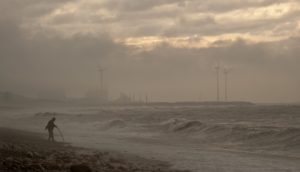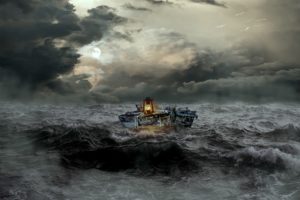Where is Jesus in the Storm?

Yesterday I flew from one rainy/underwater side of the country to the other side, which happens to be on fire. I woke up early to leave for the airport, only to be greeted by the news that an earthquake had rocked Mexico while I slept.
As Irma blows her way through the Caribbean, killing dozens and leaving desolation in her wake, Houston begins to rebuild and recover from Harvey’s destruction. Meanwhile, Floridians follow their familiar hurricane protocols—filling sand bags, boarding up windows, and stocking up supplies.
When we scheduled our Oregon trip months ago, obviously we couldn’t have known we’d be traveling during the biggest weather events in recent history. I never thought I’d be praying for rain on vacation! Specifically, I’m praying for more rain in Oregon and a lot less than anticipated in Florida and the Atlantic Coast.
The topic that’s normally small talk has now become a buzz around the country. I’ve heard about harried preparation, well wishes, and heartwarming stories of sacrifice and daring rescues.
On the other side, fear prevails. And anger.
I’ve seen comment threads with hundreds of skeptics decrying a God who would let catastrophes like Harvey and Irma happen. I’ve seen ugly, insensitive comments claiming those who suffer deserve God’s judgment.
I’m reminded of a scene in Shakespeare’s King Lear.
In Act 3, Scene 2, King Lear stumbles out into a storm in a fit of insanity. Here’s what he said:
LEAR
Blow, winds, and crack your cheeks! Rage, blow!
You cataracts and hurricanoes, spout
Till you have drenched our steeples, drowned the cocks!
You sulfurous and thought-executing fires,
Vaunt-couriers of oak-cleaving thunderbolts,
Singe my white head! And thou, all-shaking thunder,
Smite flat the thick rotundity o’ th’ world,
Crack nature’s molds, all germens spill at once
That make ingrateful man!
You have to see it in person to get the whole effect, but if you haven’t, imagine a grey-headed man with a long white beard, shouting these lines, wide eyed and arms flailing out in the middle of a thunderous downpour.
In contrast, followers of Jesus can learn from the disciples’ example how to respond to storms, both literal and figurative.
In Mark 4:39, Jesus and His disciples had taken a boat out on the sea. It was nighttime, and He had gone below the stern to take a nap. Soon, the wind was blowing so hard, it threatened to capsize the boat.
They woke Jesus, asking Him, “Don’t you care that we’re all about to die?”
With one quick command, He stopped the gale. “Peace, be still!”
Mark 4:39 says the sea “became perfectly calm.” Jesus asked them a pointed question to get them to think about how much faith they had in Him. “Why are you so afraid? Do you still have no faith?”
The result strikes me as the whole reason Jesus allowed the storm in the first place. It resulted in them understanding Who He was on a whole new level. “Who is this, that even the wind and the sea obey Him?”
Sometimes when we ask Jesus to stop the storm, the answer is yes. In fact, I wonder—how many storms have I avoided because I asked in advance for protection or guidance?
But sometimes He doesn’t stop the storm. Instead, He asks us to walk through it, to do something we’ve never done before.
We see this when Jesus sent Peter and the other disciples across the sea in a boat on a different night.
Another storm approached. The boat was “battered by the waves.” Matthew 14 describes the waves as “contrary.”
As if that weren’t frightening enough, a ghostly figure was heading straight for them, walking across the water!
After Peter realized Who He was, he displayed a willing heart—willing to follow Jesus anywhere, even something humanly impossible. “Command me to come to You on the water.”
“Come!” Jesus replied. And when Peter remembered his humanness, he began to sink. But He knew right where his help comes from: “Lord, save me!”
Jesus reached out His hand and saved Peter from drowning.
Again, He reminded Peter that He could trust Him no matter what. “Why did you doubt?”
The disciples of Jesus held an impromptu worship service right there in the boat. “Surely you are God’s Son,” they told Him.
The Bible never mentions whether Jesus calmed that storm. In fact, the wind and waves became irrelevant after the whole walking on water thing. He had something to teach them in the middle of the storm.
Both times, the disciples got to know Jesus in a way they never had before. Both times, their faith grew stronger. Both times, Jesus was with them whether the storm quieted or raged on.
We can’t be guaranteed still waters, but we can know for sure He’ll always be here with us.



No Comments